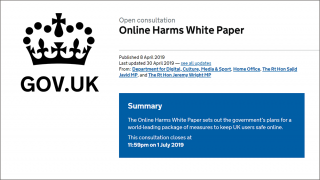Please respond to consultation on online harms

The consultation
The Department for Digital, Cultural, Media and Sport and the Home Office have launched a public consultation on the issue of online harms. The Online Harms White Paper sets out a comprehensive plan for what the government deems to be a “world leading package on online safety measures.” The deadline for submitting a consultation response is 1 July 2019.
Why your support matters
In the age of the General Data Protection Regulation (GDPR), where private companies and organisations are being subjected to much more stringent legislative measures in how they collect and store data, it is odd for the government to seek to expand its supervisory powers over online content while at the same time diminishing the rights of private citizens over data. The White Paper proposes a regulating body which polices online content for illegal, or otherwise harmful content.
Such a regulating body would no doubt have a negative impact on the already serious trend we are seeing in this country whereby freedom of expression and opinion are being severely eroded. Whether by direct regulation, or the consequent chilling effect this will have on online content providers leading them to be overly sensitive about their online content, the likely effect will be viewpoint discrimination towards conservative or Christian beliefs and opinions on contentious moral matters.
Christian Concern’s own experience in this area has been that increasingly, the culture has become intolerant of Christian expression. We have seen examples where students have been barred from professional accreditation merely for quoting Scripture in an online Facebook debate. We have seen people losing their jobs for sharing Facebook posts relaying their concerns about LGBT campaigning materials being taught to young children in our schools.
We need your help
The proposed online regulatory body affects us all. The creation of such a mechanism would surely lead to the censorship, or even punishment, of Christian viewpoints on matters like homosexual behaviour, Islam or gender ideology. Even quoting or paraphrasing Biblical passages like 1 Corinthians 6:9-10 could lead to sanction. We therefore ask you to take the time and share your concerns by answering the public consultation before the 1 July deadline.
A guide to the consultation
We hope that the following points will assist you in drafting your consultation response:
- Suitable mechanisms are already in place to prevent online harm. The Grand Chamber of the European Court of Human Rights has, for example in Delfi AS v Estonia, ruled that an internet provider can be privately fined for failing to properly monitor illegal content on its platform. In contrast, the European Court held in Magyar Tartalomszolgaltatok Egyesulete and Index.hu Zrt v. Hungary, that while an internet content provider can indeed be punished for failing to remove harmful content from its platform, that it can only be done so where sufficient weight is given to protecting freedom of expression. Precisely stated, existing remedies are already sufficient to prevent online harms. The creation of a regulatory body would only serve to unnecessarily limit freedom of expression.
- We should all be concerned about government surveillance of private communications. Private communications should be defined broadly and protected extensively under both Article 8 of the European Convention of Human Rights, as read into our domestic law by the Human Rights Act 1998, and the Regulation of Investigatory Powers Act 2000. The current statutory framework, requiring authorities to apply for a warrant before surveilling private communications, should remain the status quo.
- In May, U.S. Congress held hearings with online content providers and social media platforms to investigate alleged conservative bias. We should share the same concerns here in the United Kingdom that conservative and Christian viewpoints are being targeted for censorship or punishment on the sole grounds that they are out of step with the current cultural zeitgeist.
- The regulation of online harm and ‘hate’ speech is never value neutral. We have seen with Facebook, for example, that leftist campaigning groups like the Southern Poverty Law Centre have been consulted to determine what is and what is not ‘hate’ speech.
- There is no such thing as a cost-neutral regulator. As such, the proposed legislation would not only create new burdensome regulations for the tech industry, but it would hurt small business and innovation by requiring those being regulated to cover the costs or regulation.
- Any restriction to either freedom of expression or freedom of thought, conscience and religion requires strict scrutiny. This is underlined by the fact that both of these fundamental rights are the only two rights highlighted in the Human Rights Act 1998 as enjoying heightened scrutiny. The proposed regulatory body lacks the proportionality required to limit these rights.
